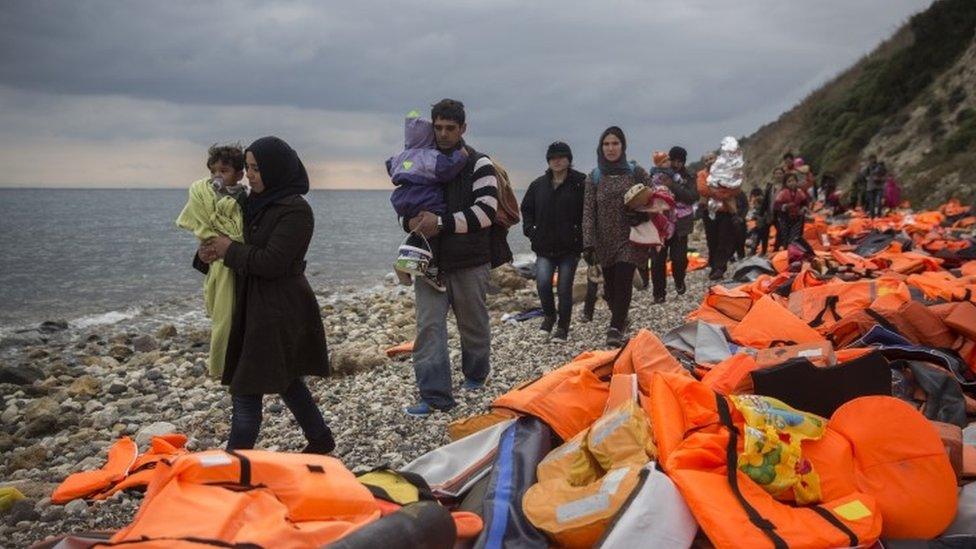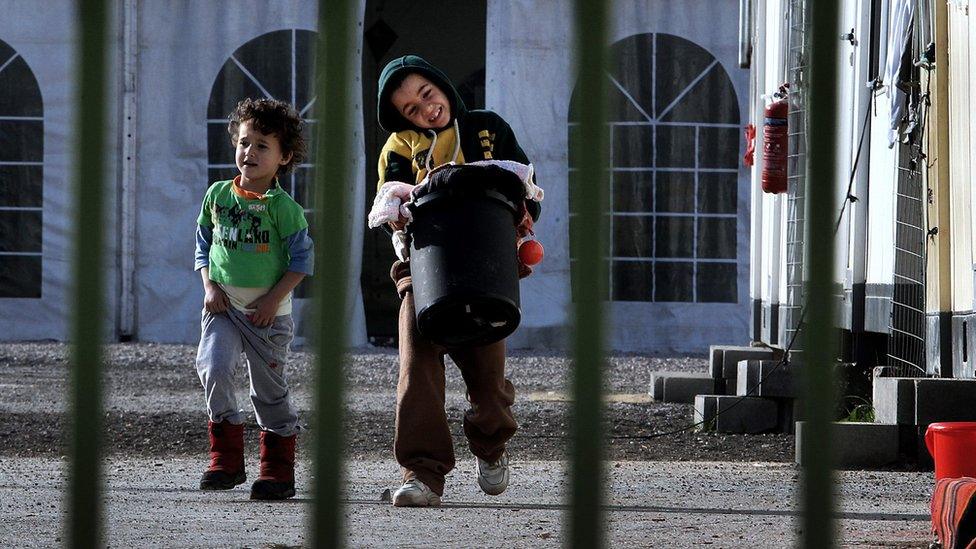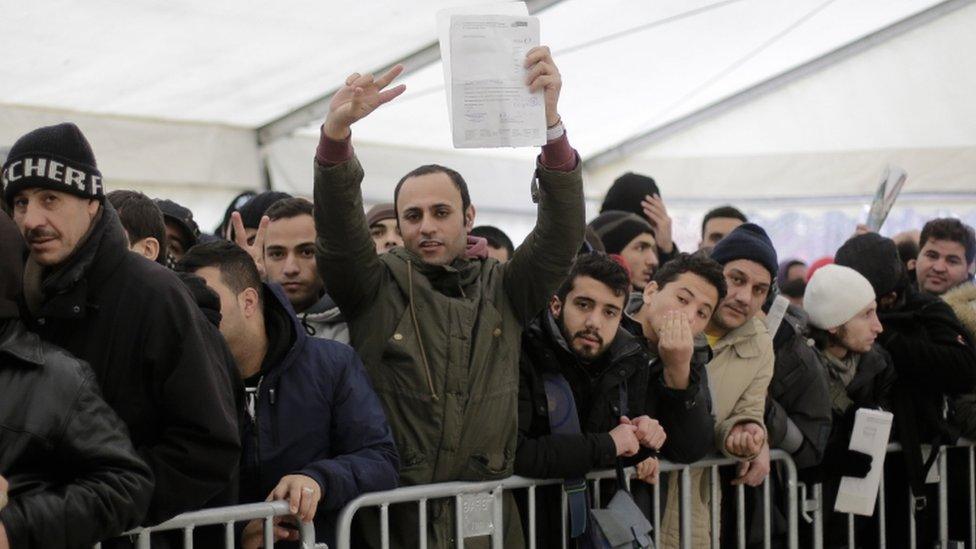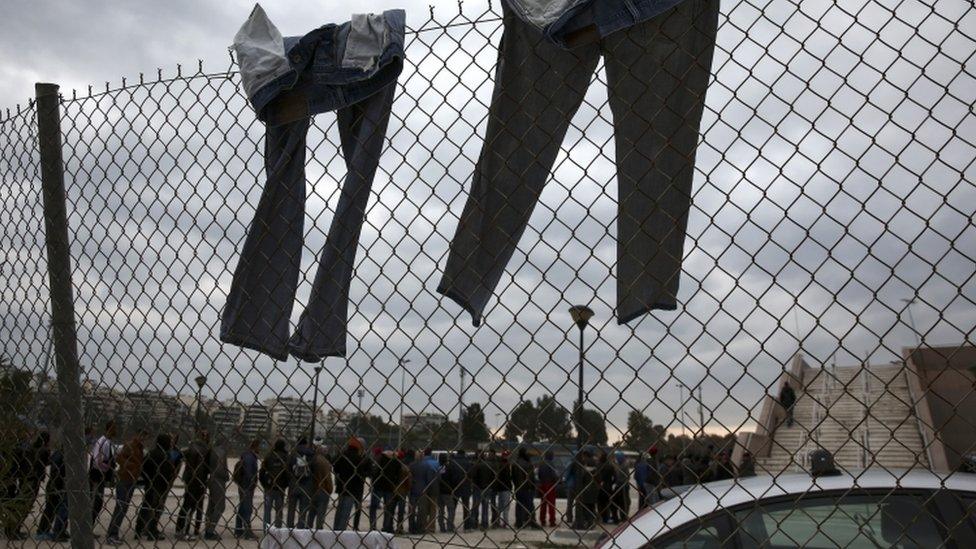Migrants crisis: Embattled Brussels' 'comeback'
- Published

Europe has seen unprecedented numbers of migrants arriving on its shores
"European Union? What Union? They're a mess! We've been left to deal with all this on our own."
"I feel let down by Europe. Not by the people of Europe but by those supposed to be leading it. We need to help refugees but where was the help for us Greeks living on the islands faced with hundreds of thousands of arrivals?"
"Our fields were trampled by arriving refugees, they left litter all over our crops. Europe criticised us for building fences to keep migrants out. But they weren't here to help us."
Just three of the outbursts I heard over the last couple of weeks, which I have spent re-tracing the phases of this year's migrant crisis.
Brussels has been much criticised for not doing more to prepare Europe for a refugee crisis despite the spiralling desperation of Syria's civil war.
Chaos on the ground, as one European country after another built fences and re-introduced border controls across the continent's supposedly border-free Schengen area, has been cited as evidence that the EU is falling apart.
The BBC's Nick Thorpe: "Greece used to handle this crisis by letting the migrants leave. Now it has to find shelter for them instead"
As the European Commission's First Vice-President Frans Timmermans put it to me, "there's no point in saying from Brussels 'Oh, the member states should be doing a better job, we're doing such a good job'. It's all nonsense.
"We're not delivering results for our citizens and as long as we're not delivering enough results for our citizens, the citizens will blame Europe for that - regardless of whom we think is to blame for that. So there is a collective responsibility to start really delivering results."
European migration: Can the EU deliver?
Mr Timmermans is now spearheading an attempt at a comeback for the Commission with a proposal for a semi-autonomous European coastguard and border patrol to better secure the EU's external borders.
But why exactly? Because the crux of the current crisis is believed to lie in Europe's outer edges.
Unprecedented numbers of refugees and other migrants use the porous coastlines of Italy and Greece as an easy entry point into Europe.
Secure these, the argument goes, and the flood of refugees and other migrants arriving by boat in Europe will drop dramatically.
Mr Timmermans is a rare creature in Brussels: he is known as a plain speaker.

Greece is a key entry point for migrants arriving in Europe
"What I find disappointing is that we wait until the pressure is extremely high before actually taking these steps… We pushed Greece for months to ask for help at the border.
"Now things are moving very fast but they should have done it earlier. But that's water under the bridge. Now we need to fix the situation."
The proposed fix is not only to form a European coastguard and border guard but also to give them the power to intervene at the borders of a country judged not to be doing the job properly itself.
Europe's small and under-funded border patrol body, Frontex, until now had to wait to intervene at sovereign borders until invited to do so by the EU country in question.
Hence the teeth grinding in Brussels at Greek intransigence. But that is not where the story ends.
EU leaders will discuss the proposals later this week at their end of year summit.
For their sake, I hope it will not be a dinnertime debate or there will be quite some indigestion at the table.

More on the migrant crisis

The pull of Europe: Five migrants tell their stories
Impact of arrivals: How one German city is coping
Memorable pictures: BBC correspondents share images that capture the crisis
Why now?: What is driving migrants to Europe

Traditional EU powers Germany and France are in favour of the plan but an increasingly influential Poland is dead-set against.
It comes down to national sovereignty and Poland's new centre-right government is less grateful, more critical and increasingly wary of ceding national powers to Brussels.
Greece and Italy are also none too keen to have "foreign" border guards on their territory but when I put that to Austria's Interior Minister Johanna Mikl-Leitner she was brusquely dismissive.
"If a country can't patrol its external borders itself we need to have an alternative.
"This is not a time for Greece or anyone else to go on about national sovereignty.
"Any European country can be affected by the migrant crisis as we've seen this year. Poland could even be next. So we have to work together. We urgently have to get on with it."
Austria is desperate to slow the flow of migrants into Europe.
Along with Sweden and Germany, it has become a destination of choice and has experienced huge increases in asylum applications.
Or, perhaps better put, Chancellor Angela Merkel is feeling the political heat.
Chancellor Angela Merkel: "We want to and we will noticeably reduce the number of refugees because it's in the interest of everyone"
Time Magazine named her Person of the Year for throwing open the doors of her country to Syrian refugees, but this weekend saw Mrs Merkel reacting to public pressure and criticism in her own party by saying Germany needs to "drastically reduce the number of migrants".
But even if the border guard is agreed at EU leader level, how effective will it be at reducing numbers?
Under international law, once a boat filled with asylum seekers is in European waters, it cannot be turned back. The asylum claims have to be processed.
A patrol force will not put off people smugglers. They do not board the dinghies themselves so do not risk arrest.
At the moment it is the people of Europe who feel exposed and at risk, caught between concern for refugees and fears for their own safety after the Paris attacks.
It is thought at least two of the gunmen posed as refugees to re-enter Europe and avoid detection.

Many of the new arrivals aim to travel to Europe
And a number of those who planned and carried out the attacks also made good use of border control-free Schengen to criss-cross Europe unhindered.
So is the lesson of the migrant crisis and the Paris terror attacks that the freedom of movement in Europe, cited as the most visible sign of European unity, has had its day?
All those I have asked on my travels across Schengen countries have told me they hope not.
Schengen eases travel and trade. People have an emotional attachment to it. It regularly comes top after peace in polls on what Europeans most value about the EU.
And, if EU leaders chose, as with external border control and Frontex, they have a mechanism at their fingertips that could improve security inside Schengen.
It is called the Schengen Information System and is designed for Schengen countries and partners, like the UK, to share cross-border information and raise the alert on individuals, vehicles and objects such as illegal weapons.

Greece is under pressure to better patrol its borders
True, it did not stop the Paris attacks or help arrest escaped gunmen.
The problem was not enough information, with national secret services liking to keep their information, erm, well... secret.
A mistake, says Krum Garkov, Executive Director of the Schengen Information System.
He argues the notion that more policemen or military on the streets can make us safer is out-dated.
"That was 20 years ago," he insists. "Now international security management is information driven. In Europe we need to become less reactive and more proactive in addressing threats in advance."
But as both Mr Timmermans and Ms Mikl-Leitner pointed out when pushed: border controls or not, 100% safe and secure simply does not exist.
What European leaders need to prove though to their electorates is that there are strategies, they have plans.
That next year, they will do more than just cope.